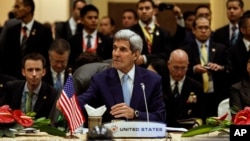Secretary of State John Kerry says the U.S. and Russia have reached a deal on a U.N. Security Council resolution that aims to identify those who have carried out chemical attacks in Syria.
Kerry made the announcement Thursday in Kuala Lumpur, Malaysia, shortly after meeting with Russian Foreign Minister Sergei Lavrov on the sidelines of a Southeast Asian regional summit.
"We also talked about the U.N. resolution and indeed, I believe, reached an agreement that should try to see that resolution voted shortly, which will create a process of accountability that has been missing," Kerry said.
The resolution, which could be voted on as early as this week, would create a panel to investigate who is responsible for a series of chemical attacks during the Syrian civil war.
The Organization for the Prohibition of Chemical Weapons is attempting to carry out a fact-finding mission on the attacks, but neither it nor the U.N. currently has the mandate to assign blame.
In 2013, the United States and Russia jointly demanded that Syria get rid of all its chemical weapons to avoid what would almost certainly have been a U.S. military strike in response to a poison gas attack on civilians in Damascus.
But the attacks have persisted, and there are concerns that Damascus is using other toxic agents, such as chlorine gas, which was not covered in the agreement and is not technically considered a chemical weapon.
Syrian President Bashar al-Assad has strongly denied using chemical weapons. He blames such attacks on rebels fighting to overthrow his government.
Russia, a major Assad ally, opposes assigning blame for the attacks and has vetoed several other Security Council resolutions critical of Damascus.
Also Thursday, Syrian monitors reported that the civil war has killed more than 240,000 people since it broke out in March 2011.
The British-based Syrian Observatory for Human Rights said nearly 112,000 of those killed were civilians, including 12,000 children. The death toll does not include the more than 33,000 people kidnapped or jailed by Syrian forces and various rebel groups.
The observatory pointed out that the massacres in Syria take place "under the nose of the international community" and accused it of doing nothing to stop the violence against civilians. It said it would not stop pushing the Security Council to pass a binding resolution prohibiting the targeting of civilians in Syria.





